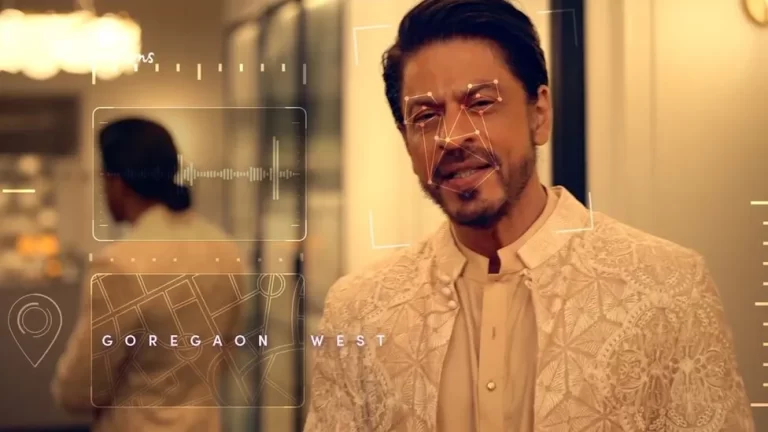Where does artificial intelligence (AI) fit into the world of Indian cinema?
While AI has already disrupted Hollywood with writers going on a strike, the debate around the contentious issue is not widespread in the Indian film industry which employs tens of thousands of people.
Some Indian film industry creators are underplaying the threat of AI for now, while others feel it needs to be taken very seriously.
Director Shekhar Kapur's debut Indian film, Masoom (1983), followed a woman's journey towards accepting a child born out of her husband's extramarital affair. For the sequel to this emotional film, which had delicately handled the complexities around infidelity and social diktats, Kapur decided to experiment with AI tool ChatGPT.
The award-winning director was amazed at “how intuitively AI understood the moral conflict in the plot” and gave him a script in seconds. The AI-generated script depicted the child growing up to resent his father, shifting the gears of their relationship from the first film.
The future with AI will be “chaotic”, Kapur says, as machine learning can do in seconds what will take a bunch of scriptwriters “weeks to do”.
According to a 2019 Deloitte report, India has the largest film industry in the world in terms of films produced each year. The industry employs 850,000 people. As AI tools get sharper and the internet is filled with uncanny deepfake videos of popular Indian stars, including Rashmika Mandanna and Alia Bhatt, its use is raising both economic and ethical questions.
The use of AI in TV and movie productions was one of the core issues of the actors' and writers' strike in the US this year, bringing Hollywood to a standstill for months.
“There hasn't been a structured conversation around the use of AI in India yet,” says Siddharth Roy Kapur, former president of the Producers Guild of India. But the time to have it is now, he says, because AI tools are “getting smarter literally every second”.
“Where we are today with AI will be very different to where we are three to six months from now,” Kapur says.

So where is India “now”?
AI is far from the point where the “push of a button” generates “everything readymade”, say Keitan Yadav and Harry Hingorani who run Redchillies.vfx. The visual effects studio was founded by Bollywood superstar Shah Rukh Khan nearly two decades ago.
This year, the studio handled visual effects of Khan's films – Jawan and Pathaan – two of India's biggest box-office hits. Yadav and Hingorani say they have been using AI tools for ideas but feel it is yet to match the 4K resolution of a motion picture.
But Guhan Senniappan is on a mission to challenge this thought. He is directing the upcoming Tamil movie Weapon, which will be the first Indian feature film to have a two-and-half minute sequence made entirely by AI.
“We're working on a superhuman saga with a lot of action sequences and I wanted to convey the story in a new way,” Senniappan says. Images of the lead actor, Sathyaraj, were used as prompts to generate a younger AI version of him.
“Using AI was a cheaper alternative to live action,” Senniappan says.
Among Bollywood stars, Khan was among the first to test AI in 2021 when he lent his face and voice for an advertisement that used deepfake technology. The ad campaign launched by Cadbury's allowed owners of small businesses to use his voice and image to promote their store and bump up sales during the pandemic slump.
Sukesh Nayak of Ogilvy India, the agency behind the campaign, says that this “one ad campaign created 300,000 ads across the country”. The agency worked closely with Khan's team in a strictly controlled environment and ensured “only certain kinds of businesses were allowed to register” to use their campaign.

With the law and the legislature in India yet to define regulations around AI use, critics say the field is open for misuse.
This year, Bollywood actor Anil Kapoor won a legal battle to protect his likeness, image, name and voice among other elements. Kapoor called the case verdict “very progressive” and good for other actors as well.
“Where my image, voice, morphing, GIFs and deepfakes are concerned, I can straightaway, if that happens, send a court order and injunction and they have to pull it down,” he told Variety magazine.
But there is another side to AI as well.
Some experts feel AI can make certain aspects of filmmaking simpler and faster. Shilpa Hingorani at Redchillies.vfx is intrigued by the prospect of automating certain VFX processes that currently need to be done “frame by frame” and require “long time periods to even generate a preview for the client”.
“Anything that reduces the time periods will definitely make the process easier and faster,” Yadav says.
Between humans and AI, does one do the work better than the other? Despite heavy reliance on AI for his film Weapon, Senniappan says he would have preferred a live-action shoot “if we had the budget and time”.
“AI is beautiful but it is not as organic as a live-action or anime because a human [being] did not act or draw it manually,” he says. After his initial fascination with ChatGPT, Kapur felt the same. “I asked myself who is smarter, and the answer was ‘I am'.”
AI doesn't have a morality of its own, “it assumes a morality from the data available”, he says. “It cannot create mystery, feel fear or love.” What it can, however, do is democratise the process of filmmaking, he says.

“If everyone has access to the same tools, organisational hierarchies will break and everyone will have the power to tell a story,” he adds.
— CutC by bbc.com


